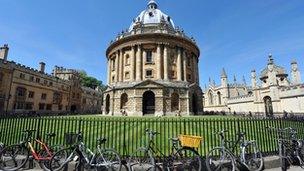Charity tax row: Oxbridge joins revolt
- Published

Oxford has raised £1.25bn over the past eight years from charitable giving
Oxford, Cambridge and other universities have joined the growing disquiet over government plans to curb tax breaks on charitable donations.
The Oxford and Cambridge vice-chancellors wrote privately to Chancellor George Osborne saying his plans risked undermining the culture of university philanthropy.
UK universities, which raised some £560m from charitable gifts last year, want him to rethink.
Ministers want to stop tax avoidance.
Mr Osborne says he is shocked by the scale of legal tax avoidance by multi-millionaires.
Under current rules, higher-rate taxpayers can donate unlimited amounts of money to charity and offset it against their tax bill to effectively bring the amount of tax they pay down, sometimes to zero.
But from 2013, uncapped tax reliefs - including those on charitable donations - are to be capped at £50,000 or 25% of a person's income, whichever is higher.
Opposition to the plans has been gathering pace. On Thursday, Business Secretary Vince Cable openly voiced concerns after hearing from universities first hand about how the changes could affect them.
And Oxford vice-chancellor Andrew Hamilton wrote a private letter to Mr Osborne pointing out how reliant the university was on charitable donations.
The leading university raised more than £1.25bn over the past eight years, with many of the gifts topping what would be the yearly £50,000 limit.
'Ill-considered'
An Oxford University spokeswoman said that the government's own policy emphasised the role of private and philanthropic investment, rather than the public purse.
"A step that penalises the government's own approach seems ill-considered.
"Oxford's fund-raising campaign recently passed its initial target over £1.25bn and we are continuing to seek support.
"The generosity of Oxford's donors provides huge public benefit, contributing to teaching, research and student bursaries.
"We have done our best, along with other universities and charities, to foster a culture of giving in the UK, and this move risks undermining that culture."
Cambridge vice-chancellor Sir Leszek Borysiewicz has also written privately to the chancellor reflecting similar concerns.
The two universities account for 44.2% of philanthropic funds secured by British universities last year.
Meanwhile Nicola Dandridge, chief executive of umbrella body Universities UK, said the considerable sums raised by universities made a major contribution to what they could offer.
The funds raised were used to offer students support through bursaries, scholarships, to improve facilities and fund research.
"Because universities are the preferred cause of major donors (gifts over £1m), we anticipate that they would be particularly hard-hit by the change in the budget.
"After a period in which universities have stepped up their game in fund-raising, this could undo some of the excellent progress they have made."
But ministers have said they intend to stick to the plans.
Chief Secretary to the Treasury Danny Alexander acknowledged they were proving controversial, but said: "We have put in place a cap on unlimited reliefs, we have done so for the very good reason that everyone should pay a decent proportion of their income in tax and that is a policy that we are going to stick to."
But he did say the government would work with charities and philanthropists "to ensure the removal of the tax relief does not have a significant impact on charities which depend on large donations".